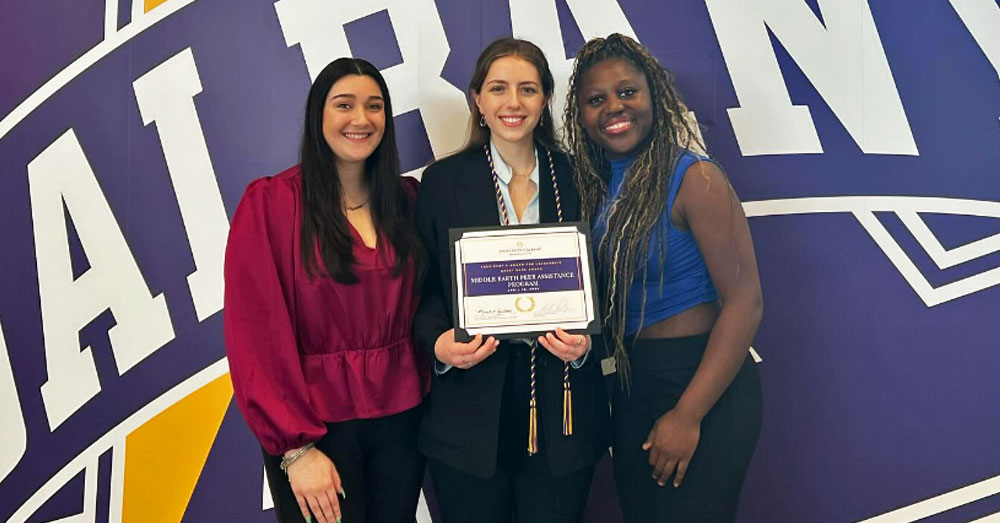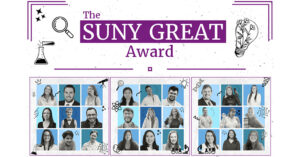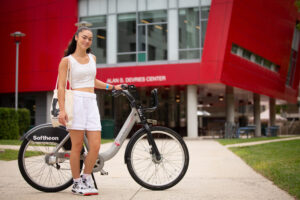May is Mental Health Awareness Month. This month is dedicated to raising awareness around challenges faced by Americans living with mental health issues. In terms of college students, the Healthy Minds survey results found that more than 60 percent “meet the criteria for at least one mental health problem—a nearly 50 percent increase since 2013…”
SUNY students are no exception to this statistic. As our campuses continue to provide mental health and wellness services to SUNY students, one such modality of care is peer support. Peer support services make way for students to share their concerns and reach out for help in moments of crisis with their fellow classmates.
One such example is the Middle Earth Peer Support Program at the University at Albany. Megan (Meg) Van Vort (she/her) is currently a senior UAlbany. She is a double major in psychology and Spanish with a minor in education, and is Middle Earth’s president.
We connected with Meg to learn more about her experiences with Middle Earth and advice for bettering one’s mental health.
What is Middle Earth?
Middle Earth is a peer assistance program at the University at Albany that first started back in 1970. The three main tracks are the hotline, peer wellness ambassadors (PWA), and peer wellness coaches (PWC). We have our peer support hotline that students can call when they need to talk about anything and be connected with other resources on campus.
Our peer wellness ambassadors execute different programs that cover a broad range of health and wellbeing topics specifically for college students. You can often find them tabling in our Campus Center and engaging with our students to educate them. Finally, we have our peer wellness coaches that meet one-on-one with students to help them with a specific concern they might have.
It is such an honor to be a part of an organization like this and be able to play a role in its legacy. This year actually, Middle Earth received a Purple and Gold award from our Student Association for Student Group of the Year, and we received a President’s Award, the Great Dane Award.
How long have you been a part of Middle Earth?
I have been in Middle Earth since my freshman year when I first trained for the hotline. I spent my sophomore year on the hotline answering calls, and then my junior year on, I have been a lab leader, so I now teach the incoming hotline students. This is a weekly three-hour lab where we cover a wellbeing topic and then do practice role plays based on that topic.
What has your experience been like working for Middle Earth?
Middle Earth has truly been one of the best things I have ever been a part of. I will never stop talking about this organization and the work that we do. I have learned so much from being in Middle Earth, and it has helped me realize what I want to do with my life. I can’t imagine doing anything else.
What are your responsibilities as the President of Middle Earth?
As President, I facilitate our executive board meetings and take lead on some events that we do. Our biggest event is the Mental Health Fair, and this year was our third time putting this event on.
I am a main point of contact for Middle Earth and often represent the organization at various events. I also keep in touch with the whole organization and one thing we have really been pushing this year is the appreciation of our student helpers.
Every year on our campus, Middle Earth is one of the sponsors for the Out of the Darkness Suicide Prevention walk that we host with the American Foundation for Suicide Prevention (AFSP). I have loved being involved in the planning and attending these walks for the last two years.
Can you talk about the award you received in relation to your work with Middle Earth?
Every year, some members of the executive board attend the NASPA Peer Education conference. I was honored to receive the Outstanding Peer Education Award of 2023. It was nice to be recognized for the work that I do because I feel like I really have put so much of myself into this organization. But I do it because I love it.
I feel so privileged to be a part of Middle Earth and have my leadership position, so to me it was very validating to receive an award because of my accomplishments. I would not have been able to do what I do without the support of my supervisors, our director, and the rest of the executive board.
Please share your thoughts on why peer support is a helpful mental health service.
Peer support is critical because oftentimes as students, our first place to turn to when we need help is our friends. Peer education is important because we need trained peers who can provide accurate and timely information to students who need it. Sometimes people think peer education is not effective since we are not professionals, but that’s the whole point. We are students just like them who are going through similar things that can help.
Do you have any advice for students regarding college student mental health?
I talk a lot about different self-care activities and then I never really do them [haha]. Once I do go for a walk or journal, I always feel so much better and kick myself for not doing that sooner. One of the best pieces of advice I can give is to make time for yourself and make you a priority. It is ok to say no sometimes and take that break when you need it.
Given May is Mental Health Awareness Month, is there anything related to mental health that you’d like to raise awareness about?
I think we still battle stigma so much and people are not able or ready to have those conversations around mental health. I don’t know if we can ever do enough to support mental health. We need to keep working to ensure that every person feels comfortable asking for help when they need it.
What are your plans after graduation? Do you feel like your experience gained from Middle Earth will prepare you for your post-graduation plans?
I am currently enrolled in a BA/MS program for my Master’s in Mental Health Counseling, so I am excited to be continuing my education at UAlbany. I fully believe that my work with Middle Earth will prepare me for my graduate studies and any future job I might have. I have had some job interviews already, and I have spoken about Middle Earth in every single one.
My Middle Earth skills have certainly prepared me for my professional life, but they have for my personal life as well. When my friends come to me about various situations I will use my Middle Earth skills. I am of course dreading leaving Middle Earth, a place that I have called home for the last four years. But Middle Earth has given me my foundation and drive for this kind of work, and I can’t wait to continue it.




